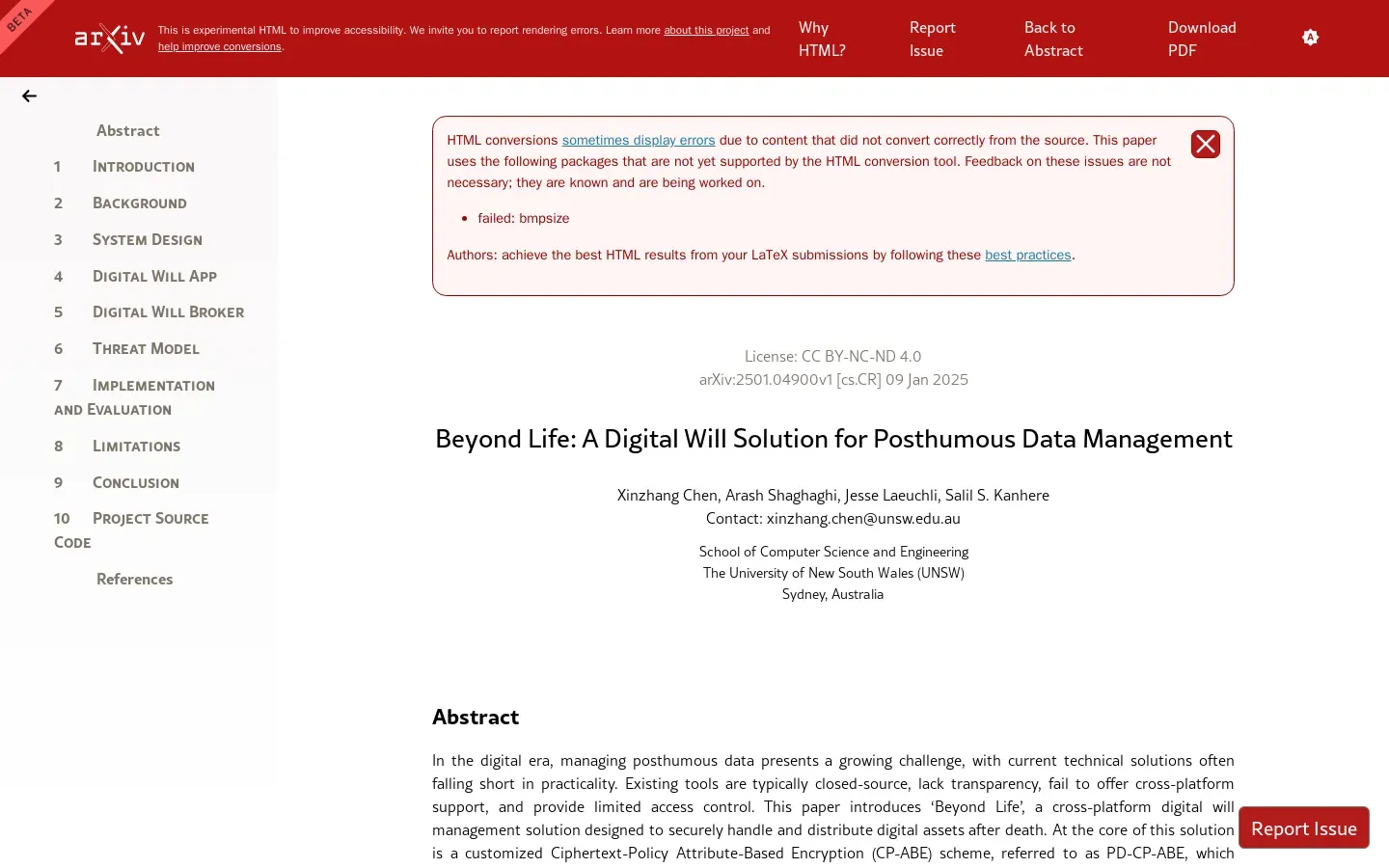
Digital Will System Introduced for Managing Online Legacies
/ 4 min read
Quick take - Researchers have developed an innovative digital will management system that utilizes advanced cryptographic techniques, artificial intelligence, and decentralized frameworks to enhance the secure handling of digital assets after death, addressing the increasing importance of digital legacies.
Fast Facts
- Researchers developed an innovative digital will management system using cryptography, AI, and decentralized frameworks to manage digital assets posthumously.
- Key features include a customized encryption scheme (PD-CP-ABE) for enhanced data privacy and a system that reduces computational load for cross-platform compatibility.
- The methodology involved secure digital signatures (ECDSA), Shamir’s Secret Sharing for key management, and a Key Derivation Function (KDF) for unique private key generation.
- The system aims to automate access policies through AI, ensuring secure and transparent management of digital legacies while complying with legal frameworks.
- Future research may focus on legal integration, regulatory acceptance, and interoperability with other digital services to expand the system’s capabilities.
In the rapidly evolving digital landscape, the management of our online legacies is becoming increasingly important. As we entrust more of our lives to digital platforms, the question arises: how do we ensure that our digital assets are securely passed on to our heirs after we’re gone? Recent research has delved into innovative solutions to address this very issue, particularly through the development of a comprehensive digital will management system. This system not only aims to streamline the process but also prioritizes security and transparency, ultimately reshaping how we think about inheritance in the digital age.
One of the standout features of this proposed system is its customized encryption scheme, known as PD-CP-ABE (Policy-Defined Ciphertext-Policy Attribute-Based Encryption). By employing this advanced encryption method, the system ensures that the documents associated with a digital will can be securely stored and accessed only by authorized individuals. The Document Decomposition Module plays a crucial role here, breaking down complex digital assets into manageable components while maintaining high levels of privacy. As heirs register for their inheritance, a Key Derivation Function (KDF) initializes with a default salt, allowing for secure key generation and distribution that is both efficient and user-friendly.
The research emphasizes the importance of trust and transparency in data handling within this framework. By integrating decentralized technologies, such as blockchain, the system minimizes reliance on single entities and enhances trust reduction among users. This decentralization fosters a more resilient infrastructure capable of adapting to emerging digital assets, which could include everything from cryptocurrencies to NFTs. The implications are vast; as our digital lives become more complex, so too must our methods for managing them.
Integration with IoT devices pushes this concept further by facilitating automated will execution. Imagine a scenario where your smart home device automatically triggers asset distribution upon your passing—this is not just a futuristic dream but a tangible objective laid out in the research. By collaborating with legal and financial institutions, stakeholders can create an integrated ecosystem that supports seamless transitions of digital legacies while adhering to regulatory and compliance considerations.
An equally significant aspect of this initiative is its focus on enhanced data privacy and control. With mechanisms such as Shamir’s Secret Sharing Scheme, sensitive information can be further safeguarded against unauthorized access. Additionally, the study highlights usability enhancements and user education as critical components in ensuring that users feel confident navigating this new terrain. By simplifying access control mechanisms and improving interoperability with other digital services, the system becomes not only secure but also intuitive.
Nevertheless, the research does acknowledge certain limitations. Areas for further investigation include developing legal frameworks that adequately address the unique challenges posed by digital wills. As regulations evolve alongside technology, ongoing collaboration between technologists and lawmakers will be essential to strike a balance between innovation and compliance.
As we look forward to the future of digital legacy management, it’s clear that advancements in cybersecurity will play a pivotal role in shaping how we preserve our online identities long after we’re gone. With tools like PD-CP-ABE and decentralized key management solutions paving the way, there lies immense potential for creating a more secure and efficient means of managing our digital legacies. The path ahead promises not only increased security but also greater peace of mind for individuals navigating the complexities of their posthumous wishes in an ever-connected world.



